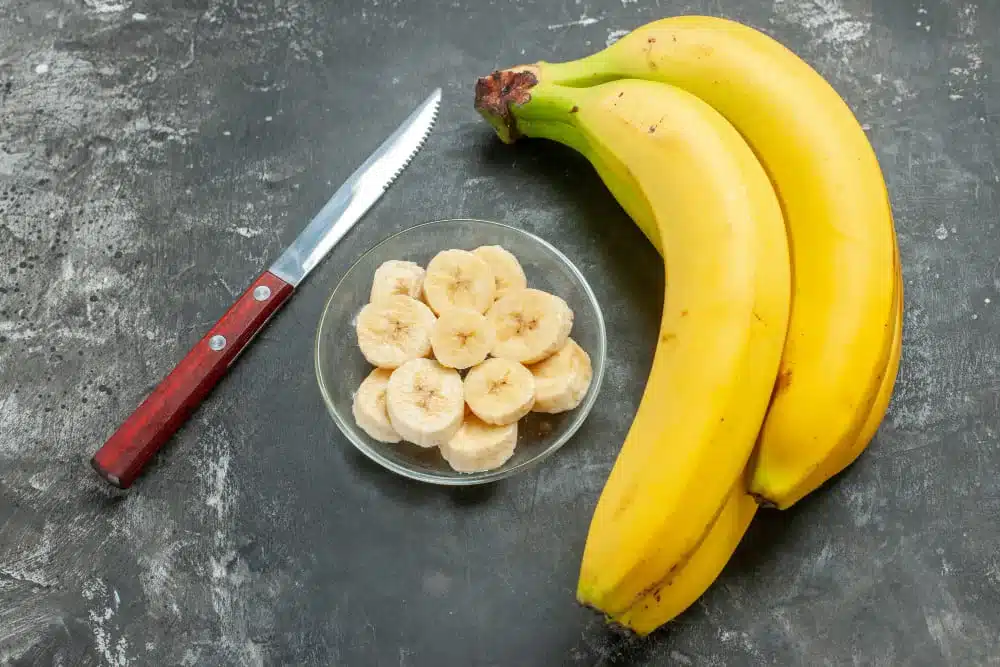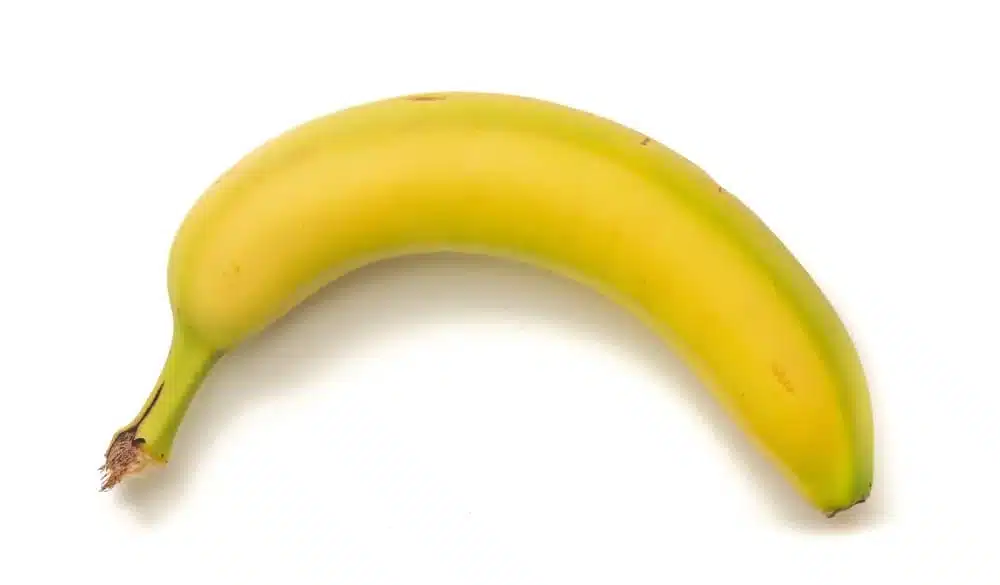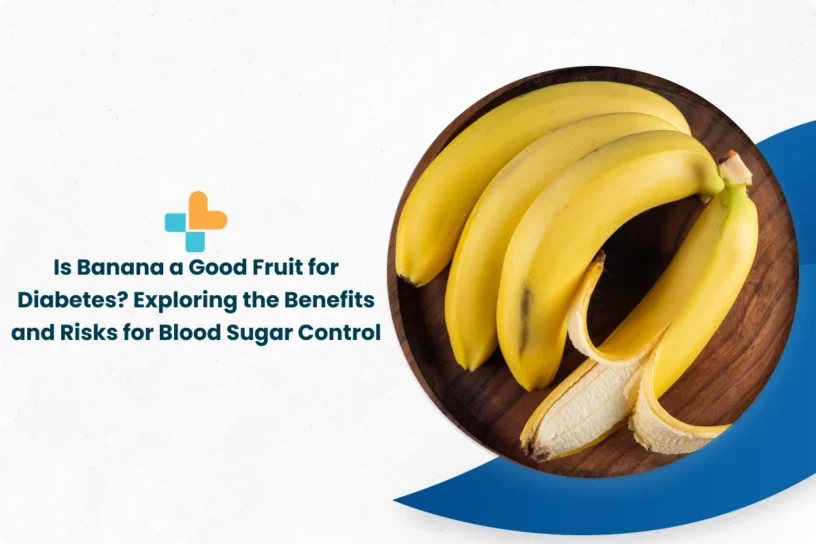If you have diabetes, you may be wondering if bananas are a safe fruit to include in your diet. Bananas are known for their sweetness and high carbohydrate content, which can cause blood sugar levels to spike. However, bananas are also a rich source of nutrients, including fiber, potassium, and vitamin C, which can provide several health benefits.
In this blog, we will explore the benefits and risks of consuming bananas for blood sugar control in diabetes.
Things You Need To Know About Bananas And Their Benefits

Bananas are the most popular fruit in the world and are grown in more than 100 countries.
There are over 1,000 different types of bananas, but the most common variety is the Cavendish.
Here are some key points to know about bananas and their benefits:
- Bananas are a great source of nutrients such as fiber, vitamin C, and potassium, which can benefit overall health.
- They are low in fat and calories, making them an ideal snack for weight management.
- Bananas are a natural energy booster due to their high carbohydrate content.
- The fiber in bananas can aid in digestion and help regulate bowel movements.
- Bananas contain antioxidants that can help reduce the risk of chronic diseases such as cancer and heart disease.
- Potassium in bananas may help lower blood pressure and reduce the risk of stroke.
- Bananas are a convenient and easy-to-eat snack that can be added to smoothies, oatmeal, or enjoyed on their own.
Keep in mind that while bananas have many benefits, they are high in carbohydrates and natural sugars, which can cause a spike in blood sugar levels. It’s important to consume them in moderation and in combination with other foods that help slow down digestion and prevent blood sugar spikes. The fiber in bananas can help slow down the absorption of carbohydrates, which can help regulate blood sugar levels.
Is Banana Good For Diabetes?
Bananas are a nutritious fruit that can be a part of a healthy diet, even for people with diabetes. However, due to their natural sweetness and high carbohydrate content, bananas can cause a spike in blood sugar levels. This doesn’t mean that people with diabetes should avoid bananas altogether, but they should consume them in moderation and in combination with other foods that help slow down digestion and prevent blood sugar spikes.
The fiber in bananas can help slow down the absorption of carbohydrates, which can help regulate blood sugar levels. Unripe green bananas have a lower glycemic index than ripe yellow bananas, which means they are less likely to cause a spike in blood sugar levels.
It’s important to consult with a healthcare professional before making any significant changes to your diet or lifestyle.

How Eating Bananas Is Good For Diabetes?
Bananas are a good source of fiber, potassium, and vitamins C and B6, which make them a healthy snack for people with diabetes. The fiber in bananas can help slow down the absorption of sugar in the bloodstream, which can help prevent blood sugar spikes after eating. The potassium in bananas can help regulate blood pressure, which is important for people with diabetes who are at higher risk for cardiovascular complications. Additionally, the vitamins in bananas can help support overall health and immune function.
However, it’s important to keep in mind that bananas do contain natural sugars, so people with diabetes should monitor their portion sizes and overall carbohydrate intake when incorporating them into their diet.
What Are The Benefits Of Banana For Diabetic Patients?
Bananas are a good source of fiber, potassium, and vitamins, which can be beneficial for people with diabetes by helping to regulate blood sugar levels, blood pressure, and overall health. Bananas are also a low glycemic index food, which means they are less likely to cause a sudden spike in blood sugar levels. This makes them a good option for a snack or a pre-workout meal for people with diabetes.
Furthermore, the antioxidants in bananas can help reduce inflammation and oxidative stress, which are associated with an increased risk of diabetes-related complications such as cardiovascular disease.
Tips To Include Bananas In Your Diet
Here are some tips to help include bananas in your diet for diabetes:
- Choose ripe bananas: Ripe bananas have a lower glycemic index than unripe ones, so they won’t cause a sudden spike in blood sugar levels.
- Control portion sizes: While bananas are a healthy snack, they do contain natural sugars, so it’s important to monitor portion sizes. One medium-sized banana typically contains around 27 grams of carbohydrates.
- Pair bananas with protein or healthy fats: Combining bananas with protein or healthy fats can help slow down the absorption of sugar in the bloodstream. For example, try pairing a banana with some nuts, peanut butter, or Greek yogurt.
- Add bananas to smoothies: Blending bananas with low-fat milk, berries, and spinach can make a healthy and filling smoothie that is perfect for breakfast or as a snack.
- Use bananas as a natural sweetener: Mashed bananas can be used as a natural sweetener in baking, such as in muffins, pancakes, or oatmeal cookies. This can be a healthier alternative to using processed sugar.
Remember to always consult with your healthcare provider or a registered dietitian before making any major changes to your diet, especially if you have diabetes.
Final Say
In conclusion, bananas can be a healthy and nutritious addition to a well-balanced and controlled diabetes diet. They are a good source of fiber, vitamins, and potassium, and have a low glycemic index.
However, it’s important to monitor portion sizes and combine bananas with protein or healthy fats to help regulate blood sugar levels. If you have diabetes, it’s essential to seek guidance and advice from a healthcare provider or registered dietitian to develop a personalized plan that works best for your individual needs.
Ayu Health is an excellent option for people seeking diabetes-related help and consultation, as they offer personalized and affordable care from a team of experienced healthcare professionals.
Our Hospital Locations
General Surgery Hospitals in Chandigarh | General Surgery Hospitals in Bangalore | General Surgery Hospitals in Jaipur | General Surgery Hospitals in NCR | General Surgery Hospitals in Hyderabad
Our Doctors
General Surgery Doctors in Chandigarh | General Surgery Doctors in Bangalore | General Surgery Doctors in Jaipur | General Surgery Doctors in NCR | General Surgery Doctors in Hyderabad




